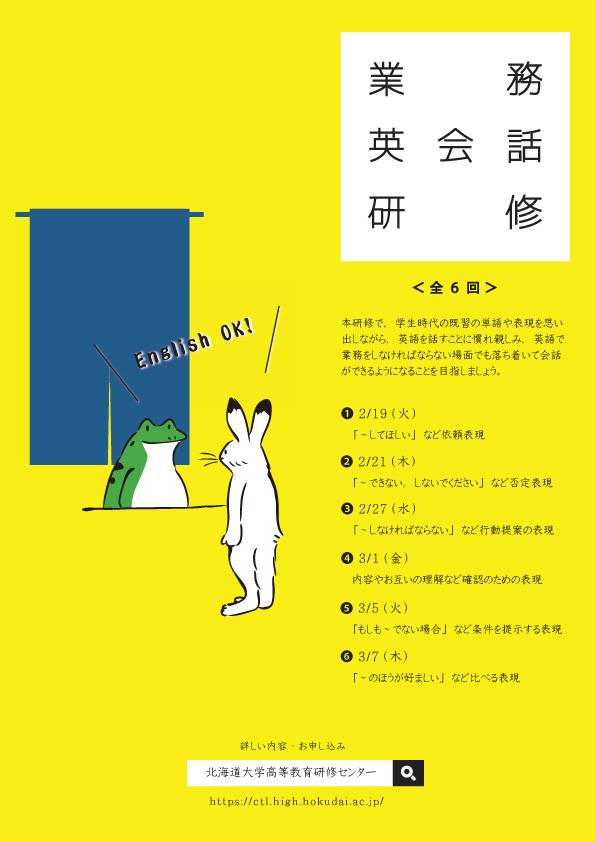- Date and time
- 2019.02.19 (Tue) 13:00-14:00
- Venue
- Hokkaido University Multimedia Education Building, 3rd Floor, Studio type Seminar Room
This seminar has finished

International students coming to the window, phone calls from foreign faculty members, — even if they are transferred to other posts, it seems that it has become a sight that can no longer be avoided.
In such cases, it is better to communicate by yourself in simple English, rather than rely on “people who can speak English” and say “Please ask ○○ to respond”.
Therefore, we will carry practical English training for faculty and staff. The purpose of this training is to become familiar with speaking English while remembering the words and expressions which you had learned in your student days and to be able to have a calm conversation even in situations where you need to work in English.
2019/2/19 (Tuesday), 2019/2/21 (Thursday), 2019/3/1 (Friday), 2019/3/5 (Tuesday), 2019/3/7 (Thursday); 13:00-14:00
Hokkaido University Multimedia Education Building, 3rd floor, Studio-type seminar room (Kita 17, Nishi 8, Kita-Ku, Sapporo)
Applicants belonging to higher education facilities nationwide who have some prior experience of giving presentations in English at international conferences, etc. (part-time lecturers are also welcomed)
30 people (In the order of application)
Tomomi Ota (part-time English lecturer. Hokkaido University of Education, Asahikawa)
Participation is free of charge, but transportation costs will be your responsibility.
■2/19 First time:
Expressions concerning the request (I want~)
Please speak slower, thank you. Please write it down.
How to tell the other party to wait with cushion words?
■2/21 Second time:
Expressions of denial
It is difficult for us to ○○. Please don’t ○○,I can’t ○○
It is OK to make the word “We” (the university, the faculty) the subject.
Convey the reason. Make it easier to understand.
■2/27 Third time:
Expression on the proposal of action.
You (It) should / must / have to ○○ / ▲ ▲ should be done (should do) / □ □ should be expressed, etc.
Convey the reason. Make it easier to understand.
■3/1 Fourth time:
Expression concerning confirmation of content and mutual understanding etc. (Review until now)
So you mean ~, Is this OK with you to ○○?
■3/5 Fifth time:
Expression that presents conditions such as if it is not, if not. (Review until now)
If it is ~ / If not ~,. etc
■3/7 Sixth time:
Comparative expression (Review until now)
It is better to ○○., It was more convenient for you to ○○.